Last Updated on December 6, 2024 by Owen McGab Enaohwo

Marketing manager Tiffany is swamped with emails, reports, and looming deadlines. She’s constantly juggling responsibilities and working late nights. Suddenly, a new project lands on her desk—a social media campaign that demands immediate attention.
Despite having a capable social media team, Tiffany hesitates to delegate, fearing that the team might not meet her standards. As a result, she misses the submission deadline and suffers from increased burnout. At the same time, her team also feels underutilized and disengaged, leading to decreased productivity.
This scenario is common in many workplaces. Team leaders and managers struggle to delegate tasks to the rest of the team. When this happens, it leads to:
- Work burden on managers and leaders
- Poor collaborative work environment
- Inefficient operations
But it doesn’t have to be this way. Effective delegation strategy and proper task management unlock your team’s potential.
In this article, we’ll explore practical tips for managers and team leaders to delegate work like a pro, looking at why delegation is important, when to delegate tasks, and how to delegate the right way.
Delegation is much easier when you have the right tool. SweetProcess is a great tool for creating, delegating, and managing tasks. Sign up for a free 14-day trial of SweetProcess today to get started. No credit card is required!
What You’ll Learn In This Guide:
What Does Delegation Really Mean?
Why Is It Important to Delegate Tasks as a Manager?
Why Most Managers Struggle to Delegate Tasks to Team Members
How to Delegate Tasks Effectively at Work: Tips & Best Practices
How to Delegate and Manage Your Tasks on SweetProcess
7 Questions to Answer Before Delegating Tasks to Your Team
Delegate Your Company’s Tasks Effectively Using SweetProcess
What Does Delegation Really Mean?

Delegation involves assigning responsibility to other team members or colleagues to complete specific tasks or projects.
Picture a chef in a busy restaurant kitchen. While the chef oversees the entire operation, they rely on a team of line cooks and kitchen staff to handle various aspects of meal preparation.
Similarly, a manager or team leader identifies tasks that can be distributed among employees based on their skills and strengths in a business setting. For example, if a manager has a tight deadline for a report, instead of doing all the work themselves, they can assign:
- The research section to a team member skilled in data collection
- Writing to someone with strong communication skills
- The formatting to an employee proficient in design
As a manager, this approach shows that you trust your team’s skills in getting the job done. It also engages employees, builds their strengths, and allows everyone to contribute to a shared goal.
Why Is It Important to Delegate Tasks as a Manager?
According to data, CEOs and managers who delegate effectively achieve a 33% increase in revenue. On top of this, delegation lightens the workload and brings in tons of perks. Let’s take a look at how effective delegation can transform your work environment:
Maximize Your Productivity at Work
A good manager knows when and how to delegate. This approach lets you focus on high-priority tasks that require expertise and decision-making skills. For instance, as a sales director, you can focus on finalizing more partnerships to increase sales while the team members handle the ordering and sales process.
As your team tackles specialized tasks, you have more free time and energy for strategic projects that benefit the company. When you manage your time better, you’ll be more productive.
Show Team Members You Trust Them With Important Work
How else will you show your team members that you trust them? Simple: by delegating important tasks to them. While some managers tend to micromanage, this has negative effects, with data showing that 46% of employees would quit their jobs due to this habit.
However, assigning meaningful tasks signals that you believe in their capabilities. As a result, employees feel valued, are more motivated, and take ownership of their work. This is one of the best approaches to push your team to success and boost retention rates.
Prevent Burnout and Overwork
Over 50% of managers reveal they are burned out at work, making work stressful. This is a clear sign that trying to be a one-person show is a recipe for disaster. Delegation distributes the workload evenly, ensuring that no employee is overwhelmed.
By sharing these tasks, managers and team leaders can maintain a healthy work-life balance without exhaustion. This reduces the pressure on a single employee, creating a more productive and sustainable work environment.
Become a More Effective Leader

Great team leaders empower others. Delegating work is a key part of this because it demonstrates your leadership ability to manage resources and achieve organizational goals.
It’s also an opportunity to develop your leadership skills by mentoring and coaching your team. For instance, if you have a team of interns in your marketing department, this is the best time to support and guide them on important task execution. With this approach, you can identify strengths and weaknesses in the team and get a clear picture of which employees require more focus or help.
Help Team Members Develop New Skills and Knowledge
Onboarding new hires requires guidance as they familiarize themselves with the work. Delegation can boost the process since it’s an opportunity to learn and grow. By assigning responsibilities to the newbies, you develop their skills and expand their knowledge much faster.
As your new hires gain experience, they become valuable assets to the department and the entire organization. Therefore, it’s essential to factor in delegated tasks as part of the employee onboarding.
Why Most Managers Struggle to Delegate Tasks to Team Members
While delegation skill offers many benefits, many managers struggle to relinquish control and effectively distribute tasks. Here’s a closer look at the common reasons for this:
Worried About Passing off Work to Someone Else
Many managers hesitate to delegate because they are concerned about the quality and outcome of the work when it’s handled by someone else. This worry stems from a fear that team members might not have the necessary skills or knowledge to complete the tasks to the desired standard.
In some cases, managers might have had negative experiences where a team member failed to meet the standard. This concern can lead to micromanagement and reluctance to entrust team members with essential responsibilities.
Belief That No One Can Do It Better Than You
While we all have our work styles and approaches, it doesn’t mean only the manager can do a good job. A common barrier to delegation is the belief that no one else can perform the task as well as the manager can. This mindset leads managers to take on excessive workloads rather than assigning some tasks to the rest of the team.
As a team leader, you must understand that employees have unique perspectives and skills that can lead to successful outcomes. Communicate clearly on the expectations and empower employees to execute the tasks.
Nervous About Letting Go
It might be hard to let go of tasks if you are primarily involved in every aspect of work. This nervousness about giving away control comes from a fear of the unknown or trust issues in the team’s capabilities.
However, clinging to control can affect creativity and innovation within your team. Failing to embrace delegation fully also means your team will not grow, and you’ll be overburdened. You can overcome this nervousness by reading some leadership and management books to change your perspectives.
Afraid That It Will Take Longer to Do the Work
If you normally execute tasks like creating a content calendar within a day, you might be afraid that a team member might take longer than that. However, this is not always the case; delegating can speed up the process, especially if you train employees and provide proper guidance on what they need to do.
Investing in delegation from the start helps you create an autonomous team that can handle tasks independently. This way, you can trust them with future work as you focus on more strategic roles.
Scared About Losing Control
Delegation requires a level of trust and a willingness to accept that things may not always go as planned. This fear of losing control influences managers to hold on to tasks instead of assigning them to others.
However, if you set clear expectations and support your team, they can still complete the tasks on time. Take on an oversight role to create a productive work environment.
How to Delegate Tasks Effectively at Work: Tips & Best Practices
Every manager or team leader needs to learn how to delegate effectively. But how can you implement this? Here’s a roadmap to get you started on the delegation process.
Know What to Delegate
Not everything needs your personal touch. If you have repetitive tasks that don’t require strategic thinking, these can be prime candidates for delegation. For example, if you are working on a marketing report, you can delegate the compiling data tasks to a team member who excels at data entry and organization.
This frees you up to focus on analyzing the data and drawing insights. To effectively manage this, evaluate your employees to identify their strengths and weaknesses. Delegating projects can teach new skills and help your team members grow.
Practice Letting Go
While this might be the toughest step, you need to ask yourself:
- What type of projects can my team handle?
- How can I guide them to excel at the job?
- What is stopping me from delegating?
Once you have clarity on these questions, you can work on overcoming the fear of letting go. Delegation can be tough, especially if you are a first-time manager, but it’s essential in boosting initiative. If this is you, start with small tasks and gradually delegate more complex ones as your confidence in their abilities grows.
In addition, avoid micromanaging the team. Instead of hovering while your employee writes a social media post, give them clear guidelines and brand voice examples. Trust them to craft engaging content while you focus on developing the overall social media strategy.
Play to Your Employee’s Strengths and Goals
All employees have different strengths and career aspirations. For instance, if an employee excels in graphic design and wants to develop marketing skills, delegate some tasks on the marketing campaign that include design elements.
If you are unsure about the employee goals, organize one-on-one sessions to understand what they’d like to do for the team. This keeps the team engaged and motivated while ensuring each task is completed by the most qualified person.
Clarify Priorities

Is the deadline for that report rigid, or is there some wiggle room?
Make priorities clear—what absolutely needs to be done first and what tasks can follow.
This helps your team focus their efforts and manage their workload. For instance, let your team members know that the data analysis for the marketing report is crucial for the upcoming meeting and needs to be completed by Friday. At the same time, the in-depth competitor analysis section can wait until the following week.
If you have an existing action plan, you can use this to help communicate deadlines and the importance of each task. This way, you avoid confusion and complete essential tasks on time.
Define the Desired Outcome
Don’t just tell your employee, “Write a report on social media engagement.”
Clearly define what success looks like. Are you looking for an in-depth analysis with recommendations for improvement or a high-level overview of key metrics?
The clearer your expectations, the better equipped your team will be to deliver exceptional results. Provide your team members with specific examples of what you’re looking for in the social media engagement report. This could be engagement rates or specific metrics like follower growth and reach.
Also, the objectives, deliverables, and any constraints should be specified to facilitate work and make the employees feel comfortable executing the task.
Carefully Choose the Right Person for the Job
Just because someone is available doesn’t mean they’re the best fit. Part of delegating is determining the right person for the role. For instance, assigning a complex financial modeling project to someone with limited experience in finance—it’s a recipe for frustration. Instead, you could delegate this to an employee with a solid background and experience in finance.
As you match tasks to team members, consider their skill set, experience, and current workload. If you have a deadline and have a team of five, evaluate who is more likely to complete the task within the specified time. This way, you don’t overburden your team and get the best results.
Provide the Right Resources and Level of Authority
It’s very frustrating for employees to work without the right tools. Ensure your team members can access specific software or data to complete the task. Otherwise, you’ll not achieve the desired outcome.
Furthermore, you should delegate authority and responsibility. Empowering them to make decisions within defined parameters fosters ownership. For instance, if you’re delegating the creation of a social media campaign, ensure your team member has access to the company’s social media management platform and brand assets.
This approach ensures that the task is executed accordingly without any hiccups.
Focus on the Goal
While some tasks require specific steps, give your team members the freedom to approach the work in a way that suits their strengths. You can direct them and provide oversight, but it’s good to encourage them to concentrate on achieving the outcome without micromanaging.
For starters, you can provide the project’s general framework and overall objective and let them determine the most effective method. This will provide space for innovation and creativity.
Establish a Clear Communication Channel

Communication in the workplace is very important. Data by Forbes Advisor shows that more than 40% of employees attribute poor communication to their reduced trust in their team and leadership. You can avoid this by maintaining an open line of communication for questions, updates, and feedback.
Here’s how to develop a proper communication process during delegation:
- Set clear expectations during the initial task assignment
- Indicate the communication channels to use; this could be tools like Slack or email
- Set up regular check-in meetings to facilitate communication and track progress
Provide feedback at all times to ensure the process is successful.
Provide Context and Guidance
Remember that your employees might not fully understand the task at hand. Instead of throwing a team member in the deep end, briefly explain the task’s purpose and how it fits into the organizational goals.
For example, explain how the results will influence product development decisions when delegating a customer survey.
A good leader offers guidance and answers questions to clarify the task. You could also provide templates, resources, or examples relevant to the task.
Be Open to New Ideas
Delegation is a two-way street. As you assign tasks, consider that your team members might have innovative approaches you haven’t considered. Maybe there’s a new tool or software that can improve efficiency.
Be open and listen to these suggestions; they might bring the best results. Additionally, you can encourage team members to share alternative approaches after delegating. This will yield more solutions and nurture their problem-solving skills.
Allow for Failure
Once you’ve delegated work, understand that mistakes are part of learning. Not everything will go perfectly every time. There might be unexpected challenges or roadblocks that affect delivery.
When this happens, treat the mistakes as learning opportunities. Create a supportive environment where your workers feel safe taking risks and learning from failures. You can also provide constructive feedback that focuses on improvement. A safe space for experimentation and learning leads to better results in the long run.
Invest in Training
If a particular task requires specific skills, it’s important to provide ongoing training and development opportunities. For instance, you can offer workshops, conferences, and online courses relevant to the roles. Training is essential in operations management because it allows you to focus on strategic work while delegating the rest to the team members.
Investing in your team’s growth strengthens their capabilities. It also pays off in the long run because you can now delegate to a more capable team.
Be Patient
Think of the first time you worked on tasks as a new employee. It probably took you some time to overcome the nervousness and complete the assignment. In the same way, your employees might not be as fast or efficient as you.
Don’t expect immediate perfection. As you delegate more tasks, your team will become more comfortable taking ownership and managing their workload. Be patient, support them through the learning curve, and provide constructive feedback. With time, they will become confident.
Motivate Your Team

Did the team of interns deliver work before the deadline? Recognize their efforts and achievements to keep them motivated. A motivated team is a productive one. You can celebrate successes via performance bonuses, verbal praise, or mentions during team meetings.
Delegation is more than assigning tasks. Inspiring your team to do more shows that you value their work and keep them going.
Learn to Say “Thank You”
Express gratitude for your team members’ contributions to keep them motivated. A simple thank you goes a long way in building morale and loyalty. For example, send a thank-you note or give a shout-out during a meeting.
Taking a moment to recognize their accomplishments publicly boosts morale and reinforces the value of delegation. This shows your team that their hard work is appreciated and motivates them to exceed expectations.
Trust but Verify
While trusting your team is important, you should also set up systems to monitor progress and ensure tasks are on track. For example, you can schedule regular check-ins or use project management software to track milestones.
However, this shouldn’t be confused with micromanaging. To keep up, you can use project management systems or tools like RACI charts to clarify roles and responsibilities. This visibility into progress helps you identify any potential roadblocks so that you can offer the necessary support.
Give Credit When Necessary
A key part of delegation is giving your team credit for their accomplishments. Mention their contributions in team meetings, presentations, or client interactions. Highlighting their achievements motivates them to take on even bigger challenges in the future.
Maintain a System of Checks
Implement a system of checks and balances to catch any issues early. This might include periodic reviews, quality checks, or peer reviews. For example, once you delegate a critical report, have another team member review it before final submission to ensure accuracy.
After this review, you can handle the final checks as the team leader.
How to Delegate and Manage Your Tasks on SweetProcess
You need task management software like SweetProcess to delegate and manage assignments. This cloud-based tool allows managers and team leaders to track the latest activity and manage tasks and procedures.
With this software, you can manage your processes and procedures and assign them to specific employees or departments from a centralized location. You don’t have to use multiple apps because SweetProcess integrates over 1,000 tools, making it ideal for task management.
Here’s a closer look at how SweetProcess operates:
How to Create a Task on SweetProcess
To create a task:
- Tap the “Tasks” button on the main menu.
- Select “Assign Tasks.”

Choose the task you want to create and then assign it.
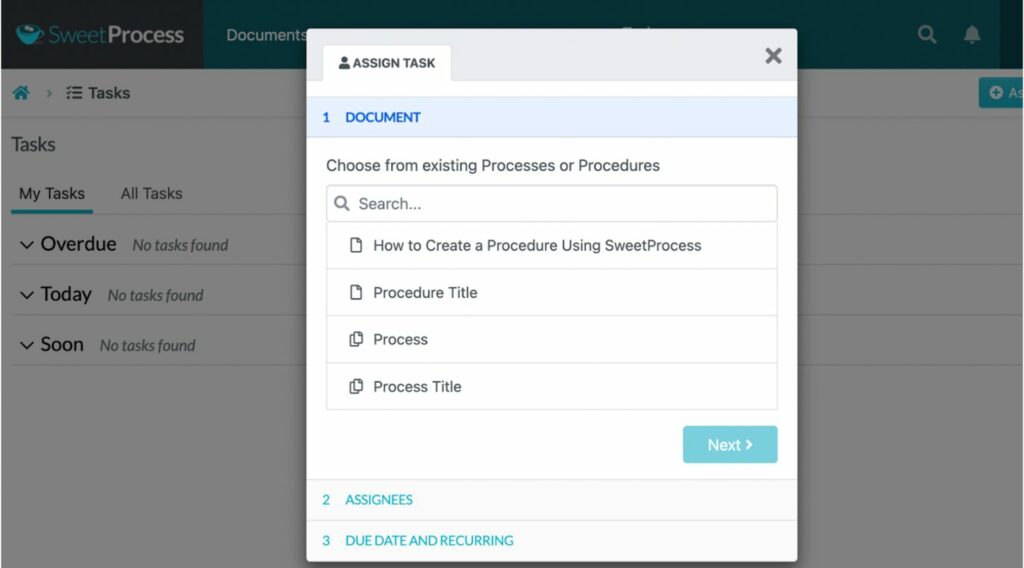
How to Assign a Procedure as a Task on SweetProcess
Assigning your procedure as a task eases the tracking process. SweetProcess allows managers to share this with the team members easily. Here’s how:
- Open the procedures tab.

Tap the three dots on the right side to choose the procedure you want to assign.

Select the option to “Assign as Task.”
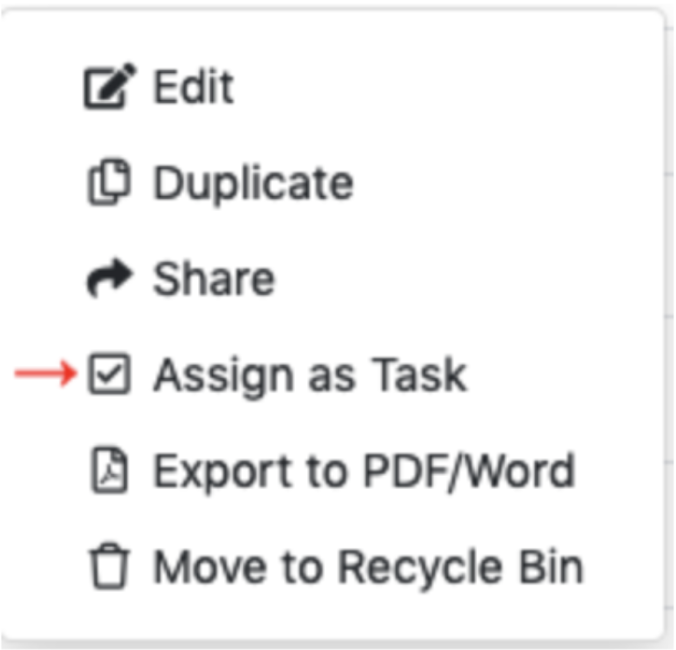
Alternatively, you can open the specific procedure, select “Actions” at the top right, and assign the task.

How to Assign a Process as a Task on SweetProcess
You can follow the same process as above, but this time around:
- Open the “Processes” tab.

- Pick the process and click “Assign as Task.”
- Alternatively, open the process and tap “Actions” to assign the task.
How to Assign a Task Based on Roles on SweetProcess
Let’s say you want to assign a task to the sales coordinator; you can use SweetProcess to delegate to the specific individual. Follow these steps:
- Open the “Tasks” dashboard.
- Select “Assign Tasks.”
- You can choose from an existing procedure or process.
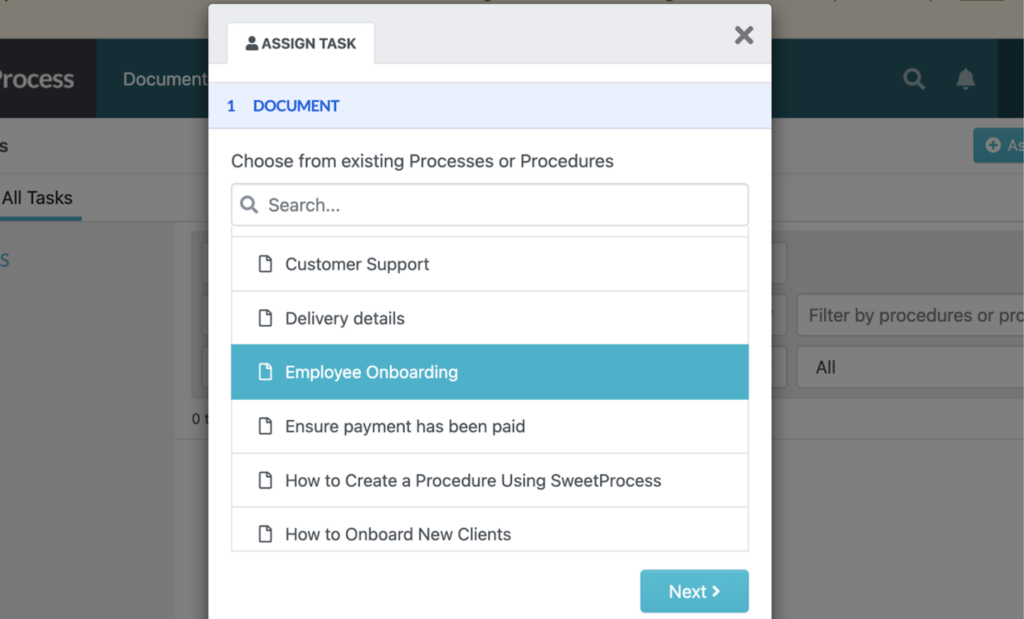
- Select “Assign to Role.”
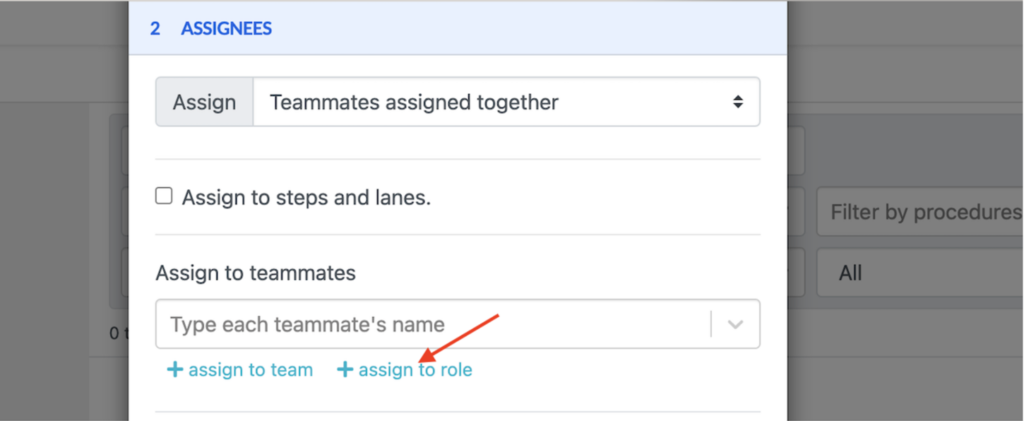
You’ll get a prompt to add the role on the next tab.
How to Assign a Task Based on Teams on SweetProcess
Alternatively, you can assign tasks to teams.
Choose the process or procedure and then select “Assign to Team.”
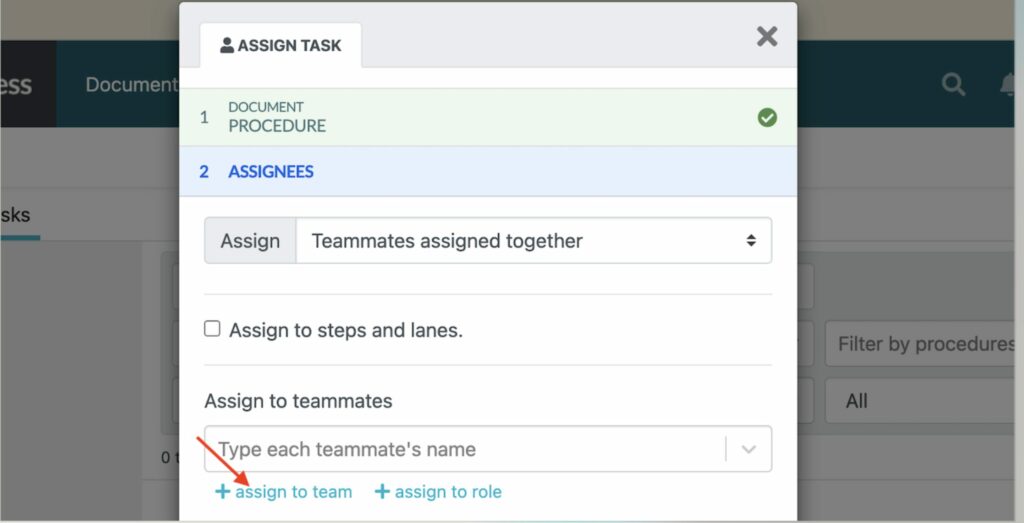
SweetProcess allows you to add the team’s or teammates’ names.
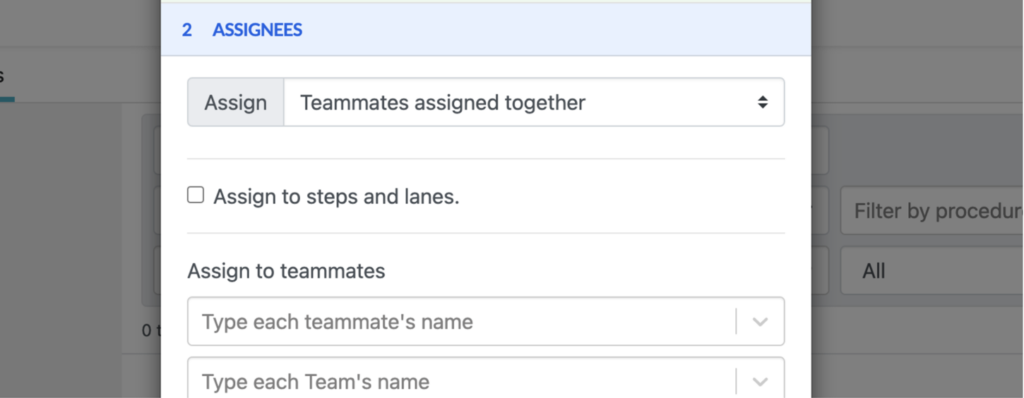
How to Manage a Task on SweetProcess
If you already have delegated tasks, you can easily manage them from the dashboard. You can view your or all tasks and take action.

Additionally, you can search for specific tasks at the top of the page. SweetProces has extensive filter options to help you find information easily.

How to Set Reminders for Tasks on SweetProcess
Some tasks are designed to be completed only once. In this case, you’ll scroll down to the “Due Date” section and select “Once Only.”
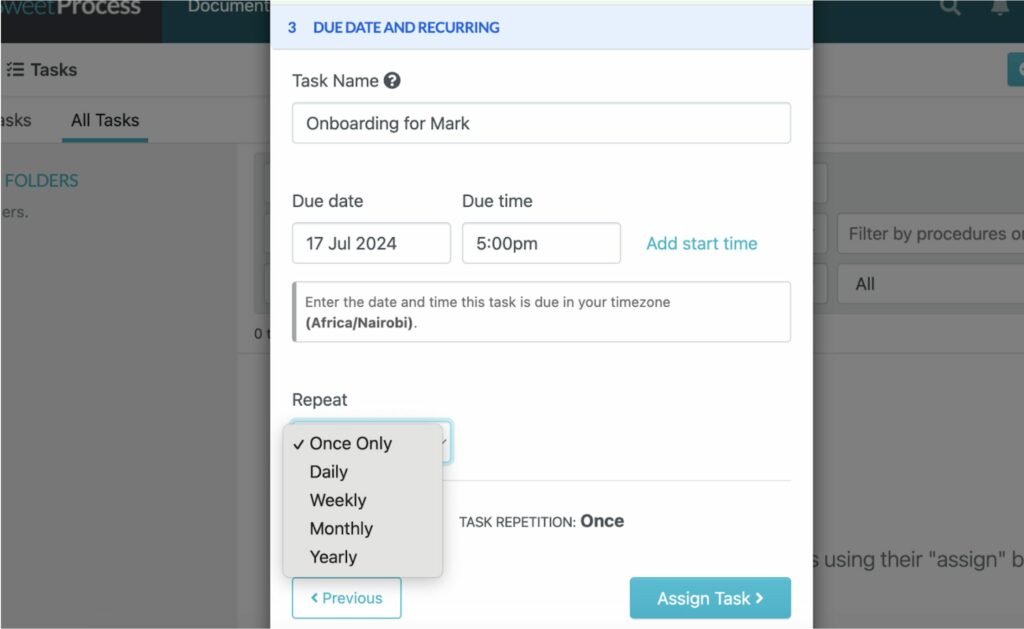
However, if the task is meant to recur, you can select the frequency before assigning it.
How to Track Assigned Tasks to Employees on SweetProcess
Once you assign the tasks, you can monitor them by checking the “All Tasks” tab.
You can view what’s pending, due, or complete from here.

Several companies are using SweetProcess to delegate tasks. A good example is Dr. Jeremy Weisz, the co-founder of Rise25. The company documented every process on Google Docs. However, Jeremy realized that the system was flawed because the team couldn’t execute tasks effectively.
He needed a tool for his employees to execute tasks independently. Integrating SweetProcess was a game changer.
He shares, “There was a specific onboarding training. ‘Okay, look at these three processes of creating a process and then creating a process.’ Anyone could go in and do that. It’s easy and straightforward. Google Docs wasn’t like that.”
The company now has an automation tool for task management.
Craig Bayer, the CEO of Optiable, has a similar story. Initially, the company documented processes manually, which affected operations. Craig was forced to micromanage the team, which took up much of his time. Additionally, tasks required multiple verifications.
These problems prompted Craig to look for a systemization tool to document business processes. SweetProcess became the go-to software, especially since they have many recurring tasks.
According to Craig, “There’s a couple of things that are super difficult that we would never do…. The recurring tasks, all those little weak points, the stuff that you know you should be doing, but then you don’t end up doing, and we just set all those as recurring tasks and now they always just get done.”
The company can now systemize all its operations.
Effective task management can streamline your business operations. However, you need the right tool to achieve this. If you are looking for the right tool, try the free 14-day trial of SweetProcess. No credit card is required!
7 Questions to Answer Before Delegating Tasks to Your Team

Delegation is a powerful tool, but it’s important to use it strategically. Here are some key considerations to guide you:
Is This Task High Impact or Business Critical?
Before delegating, assess the significance of the task. High-impact or business-critical tasks require careful consideration to ensure they are handled appropriately. For example, if the task involves securing a major client, you might want to delegate parts of the preparation but retain final responsibility.
Understanding the task’s importance helps decide the level of oversight and support needed.
Is There Someone Else Who Has (or Can Be Given) the Necessary Information or Expertise to Complete the Task?
Look at your organizational system to determine which employees have the right skills and knowledge to handle the task. If there’s a skill gap, consider training or delegating to someone who can learn the necessary skills. This way, your company tasks are completed efficiently and accurately.
Does the Task Provide an Opportunity to Grow and Develop Another Person’s Skills?
Although delegation lightens the workload, it’s also an opportunity to invest in your team’s growth. If you have new employees in the department, this can be the best moment to help them acquire new skills or experience. This strengthens the team’s overall ability to handle organizational work.
Is This a Task That Will Recur in a Similar Form in the Future?
It’s common for tasks to recur. In this case, you can train a team member to handle it now so that they can manage it independently in the future. This way, you make your team members more efficient at handling the tasks.
Do You Have Enough Time to Delegate the Job Effectively?
One thing about delegation is that it requires time. You have to explain, train, provide resources, and answer questions at the start. However, if you are pressed for time, it might be more efficient to handle the task yourself and plan to delegate it in the future when there’s more time for proper handover.
Is This Work More Aligned with Another Team Member’s Priorities?
For instance, if a task involves market research and you have a team member focused on market analysis, delegating to them ensures the task aligns with their ongoing work and interests.
Before delegating, consider the existing priorities and expertise for a smoother workflow and better results.
Would Failure Impact the Success of the Project?
For critical tasks where failure could significantly impact the project, carefully assess the risks involved in delegation. You might need to delegate with additional oversight or handle it yourself. For instance, if the task involves finalizing a crucial contract, ensure that you or a highly trusted team member reviews it carefully to ensure success.
Delegate Your Company’s Tasks Effectively Using SweetProcess
Effective task delegation is essential for maximizing productivity and empowering team development. By delegating tasks, managers can focus on strategic goals, reduce burnout, improve morale, and achieve remarkable results together.
With the right tool, the process becomes more seamless. SweetProcess helps create, manage, and track tasks efficiently, ensuring everyone is aligned and informed. You can create clear, step-by-step procedures for any task from a single location, ensuring consistent quality and knowledge transfer.
Ready to optimize your delegation process? Sign up for a free 14-day trial of SweetProcess today and take the first step toward a more efficient and productive work environment.
